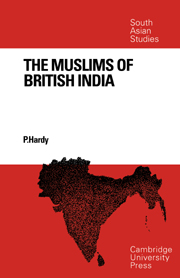Book contents
- Frontmatter
- Contents
- A note on spelling
- Acknowledgements
- 1 Introduction: the medieval legacy
- 2 The effects of British rule on Muslims before 1857
- 3 1857 and its aftermath
- 4 Muslims come to terms with British India as Muslims
- 5 Muslims move towards political community 1871–1901
- 6 Muslims acquire a constitutional identity and enter all-India politics
- 7 Religion enters politics 1910–24
- 8 The period of frustration 1924–35
- 9 The two partitions: of British India and of the Muslim community
- Maps
- A descriptive bibliography of works in European languages
- Glossary
- Index
5 - Muslims move towards political community 1871–1901
Published online by Cambridge University Press: 19 October 2009
- Frontmatter
- Contents
- A note on spelling
- Acknowledgements
- 1 Introduction: the medieval legacy
- 2 The effects of British rule on Muslims before 1857
- 3 1857 and its aftermath
- 4 Muslims come to terms with British India as Muslims
- 5 Muslims move towards political community 1871–1901
- 6 Muslims acquire a constitutional identity and enter all-India politics
- 7 Religion enters politics 1910–24
- 8 The period of frustration 1924–35
- 9 The two partitions: of British India and of the Muslim community
- Maps
- A descriptive bibliography of works in European languages
- Glossary
- Index
Summary
Lord Mayo had recognised before his assassination that Muslims formed a distinctively dangerous class of Her Majesty's subjects in India, which it would be politic to conciliate. His papers on education indeed suggest that for him they were Her Majesty's Catholic Irish subjects in India, requiring for political reasons recognition of their peculiar cultural traditions. Lord Mayo saw them as a collection of private citizens whose religion happened to be Islam, whose educated classes had formerly acted as a ruling élite in certain areas of India, and whose lower classes were currently given to religious revivalism. He did not visualise them as an active political association or community upon an all-India scale. Muslims were to be the passive recipients of limited British favours; indeed not all Muslims were to be such recipients, but only those who could be persuaded to accept a British-conceived future. Within fifteen years of the Mutiny and Rising, no British statesman accepted the Muslims or indeed any other grouping of their Indian subjects as politically activist, still less as politically self-determining. By the eighteen-nineties, however, British statesmen and officials were prepared to see in the Muslims a great and separate political community and, what is more important, many Muslims were only too willing, for their own reasons, to see themselves likewise.
BRITISH RULE ENCOURAGES COMMUNITY-CONSCIOUSNESS
The very idiom of British rule after 1857 encouraged the development of political consciousness by religious communities. The proclaimed British intention of maintaining impartially the right of each religion to the free public practice of its observances encouraged co-operative action within communities to seek redress for any infringement of that right.
- Type
- Chapter
- Information
- The Muslims of British India , pp. 116 - 146Publisher: Cambridge University PressPrint publication year: 1972



